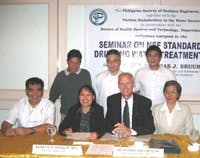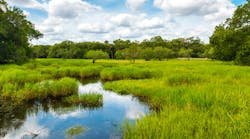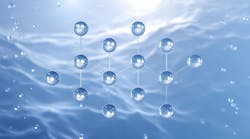NSF International has entered into an historic agreement with the Philippine National Government to use NSF standards for drinking water treatment units as the basis for all devices tested, certified and evaluated in the Philippines. The agreement, which will allow NSF technical experts to work directly with the Philippine Bureau of Health Devices and Technology, Department of Health (DOH-BHDT), is a key step that will lead to the development of Philippine standards that raise the quality of drinking water for the consuming public.
“There is no disagreement in the Philippines that water quality is a serious health issue for many people,” said Agnette P. Peralta, director, DOH-BHDT. “Having standards for the testing and certification of water treatment devices is vitally important to the consumers who must decide which product will provide them with improved water quality. We are pleased to be working cooperatively with NSF as we develop appropriate national standards in the Philippines.”
The ultimate goal of standards development is to provide uniform requirements for acceptance in domestic and global markets, and protect consumers through independent product testing and certification to these standards. All standards undergo multiple reviews and revisions to ensure they remain up-to-date with the changing needs of the marketplace and regulatory agencies.
As part of the agreement, six NSF American National Standards will be critical to this licensing agreement, including: NSF/ANSI Standard 42: Drinking Water Treatment Units - Aesthetic Effects; NSF/ANSI Standard 44: Cation Exchange Water Softeners; NSF/ANSI Standard 53: Drinking Water Treatment Units - Health Effects; NSF/ANSI Standard 55: Ultraviolet Microbiological Water Treatment Systems; NSF/ANSI Standard 58: Reverse Osmosis Drinking Water Treatment Systems; and NSF/ANSI Standard 62: Drinking Water Distillation Systems.
Under the terms of the agreement, these standards will be used as the foundation for developing Philippine National Standards. Once completed, NSF will work with local manufacturers to provide testing and certification services for demonstrating compliance with these standards.
“NSF is honored to have the opportunity to positively impact the future of public health and safety in the Philippines,” said Tom Bruursema, general manager, NSF Drinking Water Treatment Units Certification Program. “With over 60 years of experience in developing nationally—and internationally—recognized public health standards, we are uniquely positioned to assist countries throughout the world with their standards-development needs.”
Source: NSF


